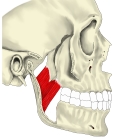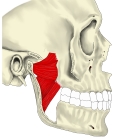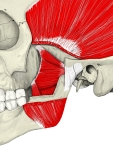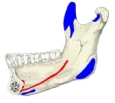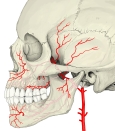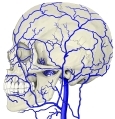内側翼突筋( ないそくよくとつきん、英:internal pterygoid muscle )


・ 「 深在して、前上方から後下方へ斜めに向かう。」 ( 日本人体解剖学 )
・ Wikipedia では 深 頭( 大半を占める ) と 浅 頭 の2頭に分けている。
・ 「 両筋( 内側翼突筋、咬筋浅部 )は作用方向は同一であり、したがって協力筋である。」(船戸和弥のHP)
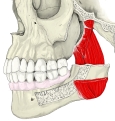 |
||||||
内側翼突筋 |
内側・外側翼突筋 |
咀嚼筋 |
内側翼突筋 |
|||
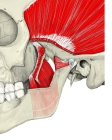 |
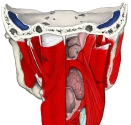 |
|||||
咀嚼筋 |
咽頭の菌 |
【 起 始 】:「蝶形骨の翼状突起後面の翼突窩から起こり、後下方に向かう。」(日本人体解剖学)
※ Wikipediaでは、この内側翼突筋を深頭と先頭の2頭に区別し、その起始を以下のようにしている。
起 始 |
停 止 |
「下顎を拳上し、かつ反対側に引く。」( 日本人体解剖学 )
・神 経:下顎神経( 三叉神経 の第3枝 )の枝である 内側翼突筋神経
・動 脈:顎動脈( 外頚動脈の終枝の1つ )の枝の 翼突筋枝
・静 脈:翼突筋静脈叢 に注ぐ静脈の1つ( 深側頭静脈?)だと思われるが、詳細は不明
The medial pterygoid ( or internal pterygoid muscle ), is a thick, quadrilateral muscle of mastication.
The mandibular branch of the fifth cranial nerve, the trigeminal nerve, innervates the medial pterygoid muscle.
It consists of two heads.
- ・ The bulk of the muscle arises as a deep head from just above the medial surface of the lateral pterygoid plate.
- ・ The smaller, superficial head originates from the maxillary tuberosity and the pyramidal process of the palatine bone.
Its fibers pass downward, lateral, and posterior, and are inserted, by a strong tendinous lamina, into the lower and back part of the medial surface of the ramus and angle of the mandible, as high as the mandibular foramen. The insertion joins the masseter muscle to form a common tendinous sling which allows the medial pterygoid and masseter to be powerful elevators of the jaw.
【 語 句 】
・ quadrilateral : 四辺形の ・ mastication : 咀嚼 ・ cranial nerve : 脳神経 ・ trigeminal nerve : 三叉神経 ・ innervate : 神経支配する ・ lateral pterygoid plate : 翼状突起の外側板 ・ maxillary tuberosity : 上顎結節 ・ pyramidal process of the palatine bone : 口蓋骨の錐体突起 ・ lamina : 薄板(/膜) ・ ramus and angle of the mandible : 下顎枝と下顎角 ・ mandibular foramen : 下顎孔 ・ masseter muscle : 咬筋
【 Innervation 】
Medial pterygoid is innervated by nerve to medial pterygoid ( a branch of the mandibular nerve ), which also innervates tensor tympani and tensor veli palatini.
Unlike the lateral pterygoid and all other muscles of mastication which are innervated by the anterior division of the mandibular branch of the trigeminal nerve, the medial pterygoid is innervated by the main trunk of the mandibular branch of the trigeminal nerve (V), before the division.
Given that the origin is on the medial side of the lateral pterygoid plate and the insertion is from the internal surface of the ramus of the mandible down to the angle of the mandible, its functions include:
- ・ Elevation of the mandible ( closes the jaw )
- ・ Minor contribution to protrusion of the mandible
- ・ Assistance in mastication
- ・ Excursion of the mandible ; contralateral excursion occurs with unilateral contraction.
【 語 句 】
・ tensor tympani : 鼓膜張筋 ・ tensor veli palatini : 口蓋帆張筋 ・ contribution : 寄与 ・ protrusion : 突出(すること) ・ excursion : 逸脱? ・ contralateral : 反対側の



